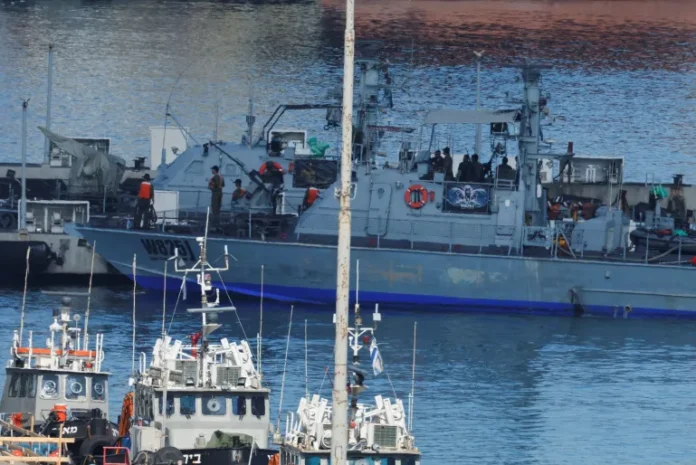Israeli Forces Block Humanitarian Convoy in International Waters
Israeli naval forces have intercepted an aid flotilla bound for Gaza, detaining dozens of international activists, including Swedish climate campaigner Greta Thunberg. The incident, which took place about 70 nautical miles off the Gaza coast, has sparked widespread global criticism and renewed debates over Israel’s blockade on the war-torn Palestinian enclave.
According to Israel’s Foreign Ministry, vessels from the Global Sumud Flotilla (GSF) were “safely stopped” before being redirected to an Israeli port. Authorities confirmed that all detainees will be deported, and shared footage of Thunberg being treated by Israeli officers during the operation.
Israel Justifies Action as Security Measure
The Israeli navy claimed the flotilla was “approaching an active combat zone and violating a lawful naval blockade.” Officials described the flotilla as a deliberate provocation, insisting their actions were taken to prevent supplies from reaching Hamas. Israel also reiterated its stance that humanitarian aid is being delivered through “safe and regulated channels.”
However, flotilla organizers condemned the interception, calling it an “illegal act” and accusing Israel of ramming one of the boats and using water cannons against others.
Global Leaders Condemn Israel’s Actions
The interception has triggered strong reactions across the globe. South African President Cyril Ramaphosa said the move was “contrary to international law” and undermined the sovereignty of nations whose vessels participated. Turkey’s Foreign Ministry denounced the operation as “an act of terrorism,” demanding accountability for those responsible.
Colombia responded by expelling all Israeli diplomats and terminating its free trade agreement with Israel. President Gustavo Petro described the interception as “an international crime” and urged the release of two Colombians detained during the operation.
In contrast, Italy’s Prime Minister Giorgia Meloni criticized the activists’ mission, claiming that attempts to bypass Israeli security measures “bring no benefit to the Palestinian people.”
Protests Erupt Across Europe and Beyond

Demonstrations broke out in Greece, Italy, Germany, Tunisia, and Turkey, with thousands protesting Israel’s actions. In Italy, spontaneous rallies took place, and the country’s largest trade union CGIL announced a general strike in solidarity with Gaza. Protesters in other countries, including Pakistan, Bolivia, and Malaysia, have also voiced outrage.
United Nations and European Reactions
The UN High Commissioner for Human Rights, Volker Türk, urged Israel to immediately lift its blockade on Gaza and allow the unrestricted flow of life-saving aid. He stressed the importance of impartial humanitarian relief operations, warning that continued restrictions will worsen the humanitarian catastrophe in Gaza.
The UK’s Foreign Office confirmed it was in contact with British families of detained activists and said it had urged Israeli officials to ensure the safe resolution of the crisis. Ireland’s Deputy Prime Minister Simon Harris voiced concern for the seven Irish nationals on board, including Sinn Féin senator Chris Andrews, and called on Israel to uphold international law.
Background of the Flotilla
The Global Sumud Flotilla, carrying more than 40 vessels and around 500 people, departed from Spain a month ago. The participants included lawmakers, lawyers, and activists who declared their mission was to deliver humanitarian aid directly to Gaza.
This was the third attempt this year to break the blockade by sea; previous missions in June and July were also stopped by Israel. Critics argue the blockade worsens the humanitarian crisis, while Israeli officials maintain it is necessary to prevent Hamas from obtaining supplies that could fuel conflict.
Humanitarian Concerns in Gaza
The situation in Gaza remains dire, with international aid groups warning of famine and severe shortages of medicine. The UN-backed Integrated Food Security Phase Classification (IPC) recently confirmed famine conditions, blaming Israel’s restrictions on aid. The UN’s humanitarian chief accused Israel of “systematic obstruction,” a claim Israeli Prime Minister Benjamin Netanyahu dismissed as “an outright lie.”
Aid organizations continue to pressure Israel to allow more direct deliveries, arguing the alternative distribution system backed by Israel and the US is “unsafe and unethical.”
Greta Thunberg Responds to Criticism
Israeli officials have dismissed the flotilla as a “selfie yacht,” but Greta Thunberg rejected the claim, insisting: “I don’t think anyone would risk their life for a publicity stunt.” Thunberg, who has consistently linked climate activism with human rights advocacy, has pledged to continue raising awareness about Gaza’s humanitarian crisis.
A Growing Diplomatic Rift
The fallout from the flotilla interception is straining Israel’s diplomatic relations worldwide. With governments, unions, and international organizations condemning the action, pressure is mounting on Israel to ease restrictions and allow more aid into Gaza.
As global outrage intensifies, the fate of the detained activists, including Thunberg, remains at the center of diplomatic negotiations. Meanwhile, Gaza’s humanitarian emergency continues to deepen, making the blockade a flashpoint in international politics.

